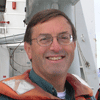An Update From the Program Director
 On March 1, 2010, we completed the first six months of the five-year construction phase of the Ocean Observatories Initiative (OOI). We’ve been tackling all the key ‘start-up’ steps of a new program, including increasing staff levels across the program, getting several major contracts in place, introducing scientists and educators to the capabilities of the OOI, while working to complete the Year 1 construction milestones. As you will learn on this website, and through the supporting documents, the OOI will deliver data to address a multitude of important science and societal questions, including those centering around climate change, ecosystem health, ocean acidification and carbon cycling. This will be accomplished through an innovative network of sensors measuring physical, biological, chemical and geological processes from the air-sea interface to the ocean floor.
On March 1, 2010, we completed the first six months of the five-year construction phase of the Ocean Observatories Initiative (OOI). We’ve been tackling all the key ‘start-up’ steps of a new program, including increasing staff levels across the program, getting several major contracts in place, introducing scientists and educators to the capabilities of the OOI, while working to complete the Year 1 construction milestones. As you will learn on this website, and through the supporting documents, the OOI will deliver data to address a multitude of important science and societal questions, including those centering around climate change, ecosystem health, ocean acidification and carbon cycling. This will be accomplished through an innovative network of sensors measuring physical, biological, chemical and geological processes from the air-sea interface to the ocean floor.
The OOI infrastructure is being built with support from the National Science Foundation, under the Major Research Equipment and Facilities Construction (MREFC) funding stream, which includes $105.93 million from the American Recovery and Reinvestment Act (ARRA). We began the first official project year in September 2009 and will continue construction through 2014. We expect some portions of the network to provide sustained data by late 2012, with full network capability by late 2014. Many additional details are available in the web pages and links below this section, and more details will follow as construction progresses.
Although the OOI Project Team is building the system, the sustained data streams and data products of the OOI will not belong to the OOI Project Team, they will belong to you, whether you are a scientist, a student, an educator, or an interested citizen. Learn how to get involved as the system takes shape over the next few years!
Paths to Involvement
The first OOI science workshop was held in Baltimore, MD, on 11-12 November 2009. In addition, we hosted a Town Hall event at the AGU Annual Fall Meeting in San Francisco in December 2009 and at the Ocean Sciences meeting in Portland in February 2010. A second workshop was held on April 29-30, in Tempe, AZ. At each workshop and meeting we provided overviews of the OOI capabilities for addressing science questions, the opportunities for involvement, and discussed the process for submitting proposals to conduct research within the OOI framework. Plans for future workshops are in development. Please join us!
Thank your colleagues!
Be sure to thank those around you who have contributed time and effort to the observatories process over the past several years. We all have benefited from the comments and insights found in workshop reports, advisory panel reports, and review panel reports. I know that I speak for the entire OOI Project Team in saying “Many thanks! ” The OOI would not have happened without a critical and discerning population of interested and committed scientists as well as dedicated program officers at the NSF.
Sincerely,
Tim Cowles
Program Director, Ocean Observing
